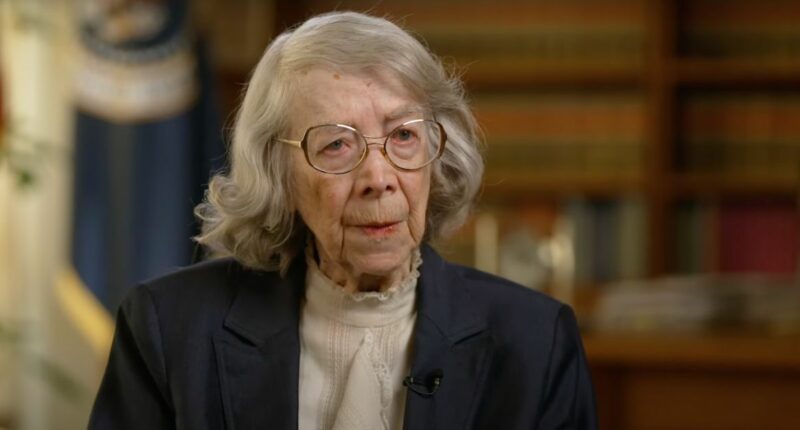Share this @internewscast.com
U.S. Circuit Judge Pauline Newman (YouTube).
The nation’s oldest serving federal judge, 98-year-old Pauline Newman, who was suspended in 2024 due to concerns about her mental health, is not giving up after being sidelined for another year due to her refusal to undergo “neuropsychological testing.” Her legal team recently filed a petition for a rehearing en banc, requesting the full U.S. Court of Appeals for the D.C. Circuit to review the “merits” of her case and the “ongoing illegal suspension.”
“Judge Newman’s extended suspension jeopardizes judicial independence and the Constitutional separation of powers,” writes the New Civil Liberties Alliance (NCLA) in its petition, filed last Friday following Newman’s second suspension late last month.
“To address the questions of ‘exceptional importance’ and to ‘maintain uniformity of the court’s decisions,’ this court should rehear this case en banc,” the NCLA stated. “Given the considerable time that has passed and Judge Newman’s advanced age, Judge Newman respectfully requests that this petition be considered as quickly as possible.”
A Federal Circuit panel had previously dismissed Newman and the NCLA’s lawsuit regarding her suspension on jurisdictional grounds, referencing its interpretation of the Judicial Council’s 2001 ruling in McBryde v. Committee to Review Circuit Council Conduct & Disability Orders of the U.S. Judicial Conference. The NCLA argued that the panel “suggested that McBryde was likely wrongly decided and all but invited a petition for rehearing en banc,” according to a press release issued Monday.
“Representing Judge Newman, NCLA requests the en banc court to overturn McBryde, address the merits of her case, and swiftly conclude the prolonged inquiry that has effectively removed a sitting Article III judge from her position,” the release states.
“As recognized by the panel, the McBryde court incorrectly determined that the Disability Act prevents any courts from considering constitutional arguments against Judicial Council suspension orders and other disciplinary measures against judges,” NCLA representatives explain. “The panel noted that the 2001 decision ‘misapplied’ the Disability Act to deny jurisdiction over cases like this one, ‘relied on a potentially strained interpretation of the relevant legislative history,’ and ‘raised constitutional concerns’ in itself.”
Newman and the NCLA argued that McBryde cannot be reconciled with other Federal Circuit decisions, noting how it stands alone to “indefensibly stop the court from considering the strong case in favor of restoring Judge Newman to the bench.” Their petition blasts the McBryde ruling for being used to contribute to “a severe Constitutional injustice” — aka her suspension.
“McBryde has prevented courts from addressing, on the merits, what a panel of this court deemed to be ‘important and serious’ arguments raised by Judge Newman,” the petition charges. “This is a case of ‘exceptional importance’ not just to the litigants, but to the very ‘principle of judicial independence’ and our constitutional structure.”
The Federal Circuit has requested that Newman, appointed in 1984 by President Ronald Reagan, undergo neuropsychological testing on account of her age. She has repeatedly refused, which prompted the committee to call for a proceeding in late August “on the question of whether her refusal constituted misconduct and any appropriate sanction for that misconduct,” per the council.
“The committee ultimately recommended a finding that Judge Newman had committed misconduct and recommended a one-year suspension from hearing cases,” an Aug. 29 order noted.
“If Judge Newman complies with our orders (as we hope she will), the task of evaluating the results of the required neuropsychological examinations may require resolution of fact disputes, which might lead to a different analysis,” the Federal Circuit said. “But the mere possibility that such future circumstances might recommend transfer does not create a meritorious due process concern today.”
As previously reported by Law&Crime, Newman was temporarily suspended last year after complaints about her demeanor and actions at work sparked an investigation. Her judicial colleagues reported concerning behaviors, including unexplained delays and habitual confusion, which led the circuit to launch its probe into the judge’s mental health.
Newman has refused to cooperate and failed to provide medical records during the council’s investigation. In addition, the Federal Circuit noted reports from doctors chosen by Newman for her legal battle have contradicted information provided to the committee, including statements from a physician that Newman cited.
The NCLA’s petition, filed on Friday, urges the Federal Circuit to “accept the panel’s implicit invitation to take this case en banc to overrule or at least cabin” McBryde and ultimately give Newman a fair chance to raise her arguments, according to the group. Newman’s team presents three issues of “exceptional importance” that it says need review.
The first is whether the Federal Circuit “erred” when it construed McBryde as “precluding all judicial review of as-applied constitutional challenges to Judicial Council orders,” according to the petition. This includes whether McBryde is “properly interpreted” and if it should be overruled, per Newman’s team.
The second is whether the committee violated the Constitution’s separation of powers by “depriving Judge Newman of the functions of her office for an indefinite period of time, a power delegated solely to the U.S. Senate,” according to the NCLA.
The third issue focuses on whether the proceedings against Newman, “in which her colleagues have acted as accusers, witnesses and adjudicators,” and declined her requests to transfer her case to another judicial council, “comport” with the constitutional minimum requirements for due process of law.
“Over the entire history of the Disability Act, irrespective of the type or severity of misconduct or disability, no judicial council has ever completely suspended case assignments to a judge for any period of time so as to leave a sanctioned judge with no judicial work whatsoever,” Newman’s petition alleges. “Nor had such sanction ever been employed prior to the passage of the Disability Act.”
Newman’s team has claimed that she has been suspended longer than any judge in the “history of this country.”
“Preventing her from serving in her constitutionally appointed role poses a dire threat to judicial independence and infringes the separation of powers,” the NCLA concluded.















